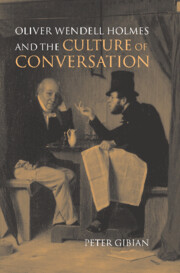Book contents
- Frontmatter
- Contents
- Acknowledgments
- Introduction
- PART ONE OPENING THE CONVERSATION
- PART TWO HOLMES IN THE CONVERSATION OF HIS CULTURE
- 2 “TO CHANGE THE ORDER OF CONVERSATION”: interruption and vocal diversity in Holmes' American talk
- 3 “COLLISIONS OF DISCOURSE” I: THE ELECTRODYNAMICS OF CONVERSATION A carnival of verbal fireworks
- 4 “COLLISIONS OF DISCOURSE” II: ELECTRIC AND OCEANIC “CURRENTS” IN CONVERSATION The cultural work of Holmesian talk
- 5 A CONVERSATIONAL APPROACH TO TRUTH: the Doctor in dialogue with contemporary truth-sayers
- 6 CONVERSATION AND “THERAPEUTIC NIHILISM”: the Doctor in dialogue with contemporary medicine
- 7 THE SELF IN CONVERSATION: the Doctor in dialogue with contemporary psychology
- PART THREE THE TWO POLES OF CONVERSATION
- PART FOUR CLOSING THE CONVERSATION
- Notes
- Index
4 - “COLLISIONS OF DISCOURSE” II: ELECTRIC AND OCEANIC “CURRENTS” IN CONVERSATION The cultural work of Holmesian talk
Published online by Cambridge University Press: 22 September 2009
- Frontmatter
- Contents
- Acknowledgments
- Introduction
- PART ONE OPENING THE CONVERSATION
- PART TWO HOLMES IN THE CONVERSATION OF HIS CULTURE
- 2 “TO CHANGE THE ORDER OF CONVERSATION”: interruption and vocal diversity in Holmes' American talk
- 3 “COLLISIONS OF DISCOURSE” I: THE ELECTRODYNAMICS OF CONVERSATION A carnival of verbal fireworks
- 4 “COLLISIONS OF DISCOURSE” II: ELECTRIC AND OCEANIC “CURRENTS” IN CONVERSATION The cultural work of Holmesian talk
- 5 A CONVERSATIONAL APPROACH TO TRUTH: the Doctor in dialogue with contemporary truth-sayers
- 6 CONVERSATION AND “THERAPEUTIC NIHILISM”: the Doctor in dialogue with contemporary medicine
- 7 THE SELF IN CONVERSATION: the Doctor in dialogue with contemporary psychology
- PART THREE THE TWO POLES OF CONVERSATION
- PART FOUR CLOSING THE CONVERSATION
- Notes
- Index
Summary
There lies the gold, and there it has slept, and will sleep, unless you can manage the collisions of discourse … to overcome the strong cohesion and detach the sparkling atom to the day.
Ralph Waldo Emerson, “Clubs”Vernon Parrington seems far off the mark when he takes the Master's final word from the Poet passage examined at the end of the last chapter – “Boys must not touch off their squibs and crackers too near the powder-magazine” – out of its conversational context, citing it as the main piece of evidence for his influential 1927 revaluation of Holmes:
If the mind is free other things will take care of themselves – this pretty much sums up Holmes's social philosophy …
Unfortunately his Brahminism sealed pretty tightly certain windows of his mind that might better have been kept open. A radical in the field of theology where personal concern brought him to serious grappling with the problem, a tolerant rationalist in the realm of the intellect, he remained a cheerfully contented conservative in other fields. He was unconsciously insulated against the currents of social and political thought flowing all about him.
But it is difficult to sum up the social philosophy of a very complex written oeuvre and of a very self-divided man.
- Type
- Chapter
- Information
- Oliver Wendell Holmes and the Culture of Conversation , pp. 110 - 126Publisher: Cambridge University PressPrint publication year: 2001



